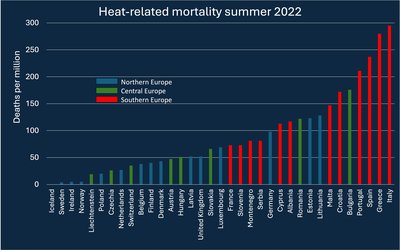
When will hot summers be so widespread that half of the population regularly experiences summers that are hotter than any summer of the past? Much sooner than most people expect, according to a recent study. Within 20 years, under an intermediate scenario of climate change, more than half of the world’s population will likely experience a summer that’s hotter than any summer of the past in 1 out of 2 years. This will be the case for nearly the entire world population just after 2050. In fact, in just over a decade such a hot summer in 1 out of 2 years may already be a fact for half of the world’s population under a high-end scenario of climate change.
These results were obtained from an approach that combines information from observations on temperatures in the past (the period 1950 - 2012) and climate model projections for the future (the period 2013 – 2069). For this study global land surface was divided into 26 regions. This geographical detail is important. Impacts of climate change vary from one region to another, but the 2015 Paris Agreement central aim addresses the globe as a whole: “to keep global temperature rise this century well below 2 degrees Celsius above pre-industrial levels”. However, such a target for a global mean temperature increase can be rather abstract for policy makers for two reasons: first, it is difficult to link a global warming target to local and regional impacts that many policy makers are more concerned about. Second, the Earth is expected to warm unevenly, e.g. land areas warm faster than oceans, and warming rates in different parts of the land surface differ.
In most of the world a large part of the observed temperature changes in the past can be attributed to anthropogenic forcing. It is estimated that hot summers in many regions of the world are now ten times more likely to occur than would have been the case if greenhouse gas and aerosol concentrations had stayed at preindustrial levels. Human impact is largest in the Mediterranean and the Sahara region.
The Mediterranean, Sahara, large parts of Asia and the Western US and Canada will be among the first regions for which hot summers will become the norm: within the next 1 - 2 decades summers hotter than those of the past will occur on average every other year. After 2035 very few summers in the Mediterranean will be colder than the heat wave summer of 2003. These early dates are consistent with the strong summer temperature responses to climate change in these regions as documented in the IPCC 4th assessment report.
Source: Mueller et al., 2016. Environmental Research Letters 11 (4)
Photo: Shirley de Jong (www.flickr.com)








